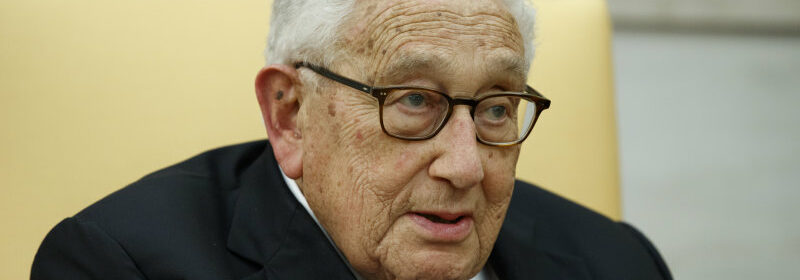‘Military conflict is probable’: Kissinger’s warning as Blinken jets to Beijing

Save articles for later
Add articles to your saved list and come back to them any time.
Washington: US Secretary of State Antony Blinken flies to Beijing this weekend with expectations low that he will make headway on the long list of disputes between the US and China. But he and his Chinese counterparts can achieve at least one thing, say analysts – show that the world’s most important bilateral relationship is not about to fall off the rails.
Blinken will hold meetings in China on June 18-19 and may meet with Chinese President Xi Jinping, sources said. He will be the highest-ranking US government official to visit China since Biden took office in January 2021.
Former secretary of state Henry Kissinger says he thinks military conflict between China and Taiwan is probable. Credit: AP
The visit comes as former US secretary of state Henry Kissinger said he believes military conflict between China and Taiwan is likely if tensions continue on their current course, though he still holds out for dialogue that will lead to deescalation — as he’s been urging.
“On the current trajectory of relations, I think some military conflict is probable,” Kissinger said in an interview with Bloomberg. “But I also think the current trajectory of relations must be altered.”
In a pre-trip briefing, US officials said they have no expectation the trip will yield a breakthrough in how the US and China deal with each other. That followed a tense evening phone call with Blinken on Tuesday during which Chinese Foreign Minister Qin Gang told the US to stop meddling in China’s affairs.
The visit, which could set the stage for a flurry of other diplomatic engagements including a meeting between Xi and US President Joe Biden later in the year, would show that the two rivals have not given up on diplomacy.
US Secretary of State Antony Blinken will be the highest ranking US official to visit Beijing since Biden became president.Credit: AP
“Both sides want to show the rest of the world that they are managing the relationship responsibly,” said Andrew Small, a senior fellow at the German Marshall Fund’s Asia program.
“For China, the most important audience is the global south. For the US, it’s partners and allies. So even going through the motions has some utility for both Washington and Beijing.”
Bilateral ties have deteriorated across the board, raising concerns that their rivalry could veer into conflict over Taiwan, which China claims as its own. The two are also at odds over issues ranging from trade and microchips to human rights.
Particularly worrisome for China’s neighbours has been its reluctance to allow regular military-to-military talks between Beijing and Washington, despite repeated US attempts. US officials said on Wednesday that setting up crisis communication channels to reduce risk was a top priority.
“Anything that would lead to greater cooperation, greater dialogue and a lessening of tensions between Beijing and Washington is to be welcomed,” UN spokesperson Stephane Dujarric told reporters on Wednesday.
While Blinken’s main goal will be “candid, direct and constructive” discussions, the US officials said, breakthroughs are not likely on any major issues, including the flow of fentanyl precursors and Americans detained in China.
Eyeing Biden-Xi meeting
A meeting on the sidelines of a G20 summit last November in Bali briefly eased fears of a new Cold War, but following the dispute over an alleged Chinese spy balloon in February, high-level communication between the countries has been rare.
US President Joe Biden with Chinese President Xi Jinping meeting on the sidelines of the G20 summit last November. Credit: AP
Beijing, frustrated by what it sees as the Biden administration’s weaponisation of economic policies, has sought to expand ties with countries in Europe, the Middle East and Africa. Xi has recently received several European leaders including French President Emanuel Macron and made a diplomatic push to court others, including US ally Saudi Arabia.
US officials expect Blinken’s visit will pave the way for more bilateral meetings in the coming months, including possible trips by US Treasury Secretary Janet Yellen and Commerce Secretary Gina Raimondo.
“Beijing agreed to the visit because it seems to be the one thing that is blocking many other things, such as working-level dialogues and the visits by other cabinet members,” said Yun Sun, director of the China Program at the Stimson Centre think tank in Washington.
Those meetings could lead to one between the countries’ leaders when they attend a September G20 meeting in India and the November Asia-Pacific Economic Cooperation (APEC) summit in San Francisco.
“Xi does want to come to San Francisco,” said Sun. “(Aside from) APEC, he also wants a bilateral with Biden. That means the groundwork must be paved starting from now.”
Reuters, Bloomberg
Get a note direct from our foreign correspondents on what’s making headlines around the world. Sign up for the weekly What in the World newsletter here.
Most Viewed in World
From our partners
Source: Read Full Article


